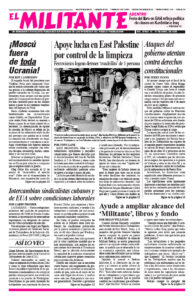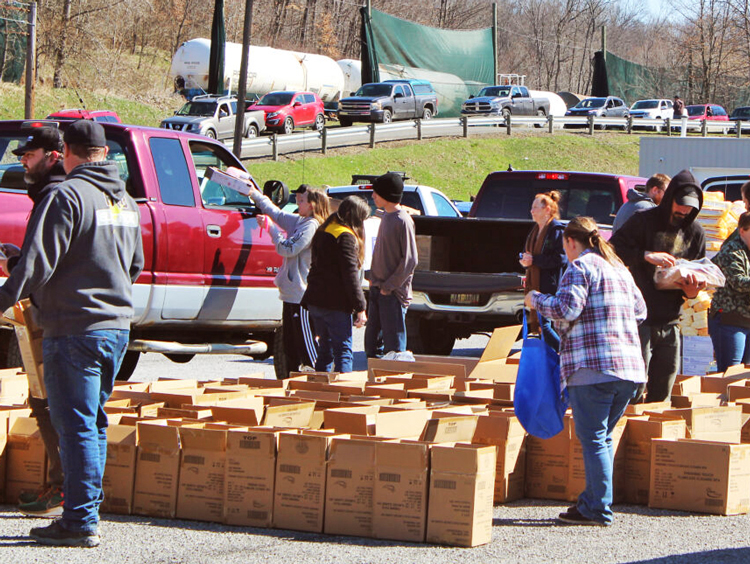EAST PALESTINE, Ohio —Working people here continue to fight to gain control over the cleanup, rebuilding and long-term health care needed in the wake of the Feb. 3 Norfolk Southern train derailment and subsequent fire and environmental disaster. And they’re winning widespread solidarity and help.
Evidence shows that residents, firemen, cleanup crews and others were stricken by the toxic chemicals released into the air, water and soil by the disaster. After over a month, the Centers for Disease Control and Prevention just admitted that seven of the 15 inspectors who conducted house-to-house interviews in East Palestine fell ill with symptoms of nausea and headaches. Those same symptoms have been reported by many local residents.
Forcing out the financial records and extent of the attacks on workers by the Norfolk Southern bosses remains a necessity to expose the real causes of the disaster.
This worker-correspondent and fellow Socialist Workers Party member David Ferguson met up with Jacob Tate in Beaver Falls, Pennsylvania, April 1. Ferguson had met Tate at the “Jeep invasion” in East Palestine two weeks earlier, when Jeep club members from Pennsylvania, Ohio and West Virginia caravanned to East Palestine to show solidarity, discuss with workers and farmers their struggle and support local shopkeepers. Tate said he knows what the derailment means, as the Norfolk Southern tracks run right by where he lives.
The “invasion” is one of dozens of significant efforts by workers and farmers across the country to organize aid for those in this area.
Tate works as a truck driver and contractor in this region, including in nearby East Palestine. He lauded the efforts to hold Norfolk Southern accountable and said working people need more information on what the railroad and the government are doing.
Ferguson explained the victory that rail workers had won, getting two major railroads to back off moves to impose a one-person crew, and that working people of East Palestine should take some credit for this.
Tate talked about his experience as a truck driver. “One thing I learned — you always listen. That tells you what’s going on. You can tell if the rear end is going out, if a tire is going bad, if the radiator is running hot. You can smell or hear the problem before any sensor tells you.”
“That’s why we say the trains need to be shorter and you need workers at the rear of the train,” Ferguson said. “They would have smelled or seen the axle that had gone bad on that train.” Tate agreed, saying he too had seen the video of the train smoking when it went through Salem, 20 miles before East Palestine.
Tate was interested in discussing why the unions “aren’t as big they should be.” I showed him The Low Point of Labor Resistance Is Behind Us: The Socialist Workers Party Looks Forward. “Opposition to life-sucking schedules, massive overtime, unsafe conditions and the two-tier and three-tier wages forced on us has been behind a lot of the strikes in recent years. That’s what this book is about,” I said.
Tate also told us about an effort by residents in West Mayfield township to organize and put pressure on the railroad. “Norfolk Southern used to park their trains next to homes there and residents complained about the noise and smell,” he said. “When they contacted Norfolk Southern, they were told to ‘deal with it.’ It took us nine months, but we got NS to stop doing that.”
Rail workers fight back
Rail workers and their unions point out how rail bosses in their drive for profits have been pushing to cut crews, run longer and heavier trains and wreak havoc with the schedules and lives of their employees. These are the conditions that lay behind the East Palestine train derailment. “There’s a ‘hurry up and get it done,’ or if it’s not done, ‘hurry up and get it out of the door’ mentality,” James Orwan, general chairman of International Association of Machinists Lodge 19 told the Wall Street Journal. That union represents workers who inspect, repair and maintain locomotives.
Scott Wilcox, a retired Norfolk Southern engineer, told Fox News the derailment “was very likely due to not having enough time given to the car inspector at the originating point to be able to fully assess that car or any of the other cars and train, for that matter.”
“They used to have between five and eight minutes to inspect a car,” he said. “But now, from what I’ve heard from car inspectors, they’re down to like between 30 seconds to a minute. So, they may not have time to check everything. The length of some of these cars, it’ll take you 30 seconds just to walk the length of it.”
“It’s profit over everything, not just safety,” Mark Wallace, a top official with the Brotherhood of Locomotive Engineers and Trainmen, told the New York Times. “It’s profit over customer service. It’s profit over employee satisfaction.”
“When the equipment’s defective, the equipment’s defective,” Lance Johnston, a former Norfolk Southern engineer, told the Times. “You stop what you’re doing, and you fix it.” Johnston was fired in 2021 after telling his manager about problems with the brakes on the engine he was assigned. He was told to use the locomotive, even though the problems made it hard to control the train and could lead to a derailment.
He’s suing to get his job back.
“We need to do what they’re doing in Greece today, stand up and stop the erosion of regular working people’s rights and the public’s safety,” Andrés Trujillo, a locomotive engineer, member and legislative representative of SMART-TD Local 1138 in Florida, told the Militant. After a head-on collision and derailment that killed 58 passengers and crew members in Greece Feb. 28, rail workers went on strike for days and mass protests spread across the country.
Another result of the outpouring of anger by working people at both the rail bosses and the government for the conditions that led to the disaster in East Palestine was a bill signed into law in Ohio March 31. It mandates a two-person crew on freight trains and requires that wayside detectors alongside tracks that monitor overheating in wheel axles be installed closer together.
In fact, Norfolk Southern and other railroads set these detectors not to react until ultra-high temperatures are registered. The train that crashed in East Palestine didn’t send an alert to the crew until after a detector read a temperature of 253 degrees F above normal, too late for the crew to prevent the derailment.
But new regulations rely on the government agencies to act on behalf of rail workers. The government showed its real stripes last fall when President Joseph Biden led a bipartisan Congress to bar rail workers from striking and forced down their throats a contract they had voted down.
Workers need to rely on ourselves, to use our unions to defend our class interests and stand up for all those who are threatened by the bosses’ greed.
Workers control, not technology
In the derailment of a Norfolk Southern train in Sandusky, Ohio, last October, the Federal Railroad Administration reported that after inspecting a suspect wheel bearing “the crew requested permission to set out the subject car multiple times and requested support from mechanical inspectors.” But “the crew was then directed to move the train,” the FRA said. “After the train travelled another 7 miles, it derailed due to a burnt journal bearing.”
“Initial reports state one tank car was punctured and leaked molten paraffin wax into the surroundings.” As of mid-February that paraffin, which had melted and blocked up the sewers, still has the main road there blocked.
“The crew should be empowered to do the right thing,” Clyde Whitaker, state legislative director for SMART-TD, told an Ohio legislative committee. “And not be told otherwise to commit an unsafe act.”
Interviewed by WKYC in Cleveland, John Hiatt, a former engineer and now an investigator in rail accidents, said, “A long train, the only way you can inspect your journal [the wheel hub over the axle] to make sure they’re not hot and smoking is visually. You just can’t do that with one or two persons on a locomotive.”
He explained that the detectors were invented to justify eliminating cabooses and cutting rail crews.
Rail bosses consistently downplay the importance of the eyes and ears of rail workers for safety, both to themselves and to those who live by the tracks. Norfolk Southern CEO Alan Shaw told a U.S. Senate hearing, “We’re not aware of any data that links crew size with safety.”
Their answer to opposition to their moves to slash crew size is to say they’ll be replaced by new technology. The fact this doesn’t work was captured by the initial National Transportation Safety Board report on the East Palestine disaster. It said, “This was 100% preventable.”
What is needed is a crew of four on every train, two on the locomotive and two on the back end, with trains limited to no more than 50 cars, with control over rail safety in the hands of their unions.


